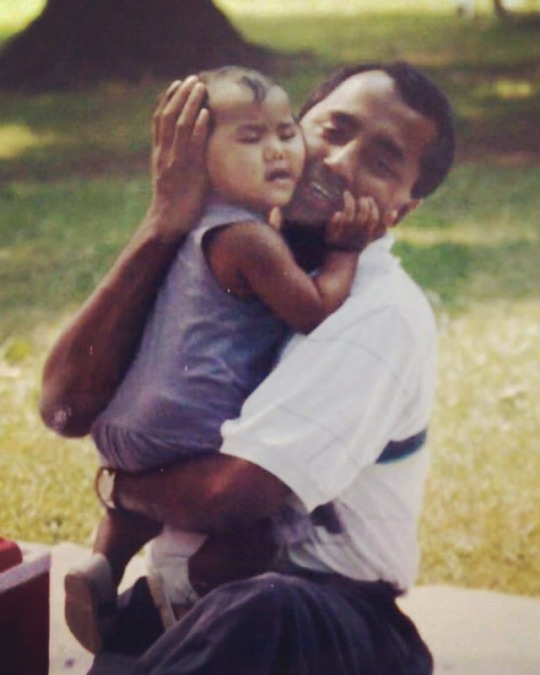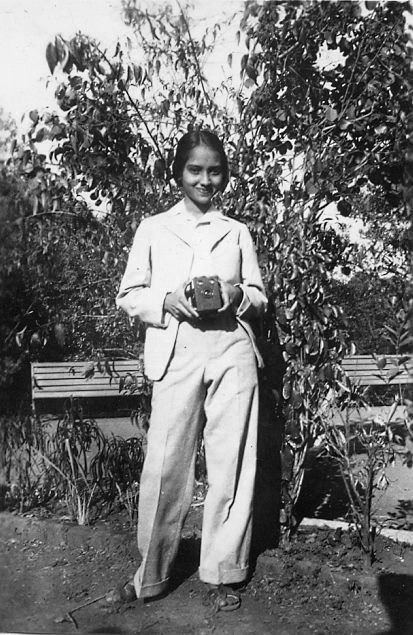Photo
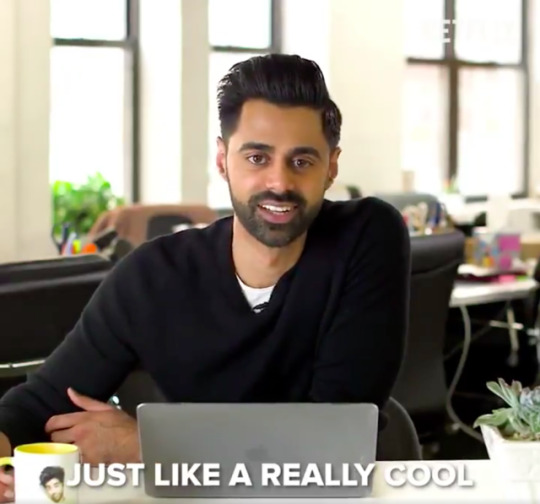
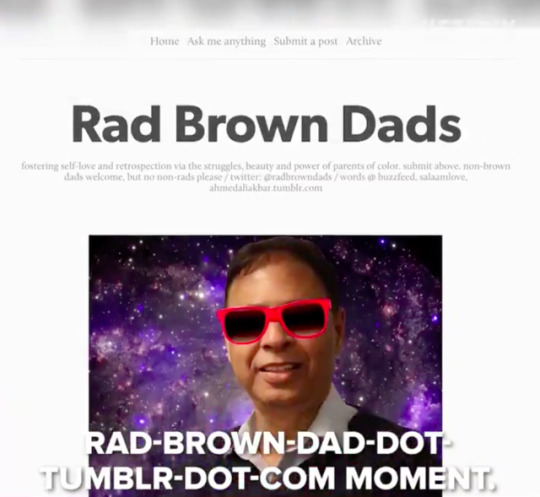
This blog has long since been dormant, but shoutouts to @hasanminhaj for shouting out the blog.
Full video here.
19 notes
·
View notes
Text
My mamoo passed away last week. When my friends and co-workers asked who I lost, I called him “my uncle”, but in English, he’d be more accurately described as my “first cousin once-removed” or my mother’s cousin. I have been devastated to lose him. Some folks not familiar with the culture I was raised with probably read this and think: "I’m not even that close to my first cousins, so why is he grieving about his Mom’s cousin?" As with all of my work, I am incredibly loathe to explain things that are inherent to my perspective or attempt to validate my world view as the child of Muslim immigrants.
But I think the reason I grieve my mamoo is important. And I want people to know the reason. I also want my family, who for better or worse all share Facebook as a common platform, to understand what he meant to me.
The crux of the importance is in that word, mamoo. "Mother’s brother."
In Urdu and in practice, we never distinguished between my mother’s actual brother and my mother’s cousin, nor my father’s sister and my father’s cousin. All were the same. And family comes with things like loyalty, respect, and unconditional love. It also comes with drama and arguments. But family is there for you.
Now like any family, you are closer to some branches and less to others. For whatever reason, this mamoo and his three other siblings has always been very close to our branch. Every single one of my mother’s four cousins has been deeply present throughout my life. They were (and are!) older than my parents and all but one were born in British India, in Panipat, before Partition.
Somehow, losing him, especially so suddenly, made me (and my sister Zainab, who independently came to the same conclusion) realize something — the culture of my mother’s family (and probably my father’s too) is seeped through with a refugee’s loss of home. My mother and everyone younger than her only knew Pakistan, but they inherited this trauma of their parents losing self, of losing home, of giving up what we knew to go to a new homeland and not by choice. And they passed that down to us. I’ve written about why this Partition means a lot previously here (https://www.buzzfeed.com/ahmedaliak…/not-quite-eat-pray-love). But even still I did not realize that how deeply these lessons penetrated my consciousness until I lost my mamoo.
My mamoo was a child when that happened. I can't even bear to think of all the young children whose lives ICE has ruined, but while mamoo and family would never be able to return home to India, the family stayed together at least. And he and his siblings have been a living link to that past we were inculcated with. My grandfather died when I was two, so my mamoo was the oldest man on my mother’s side that I regularly spent any time with. I hesitate to say he was like my grandfather, because that wasn’t the relationship at all and it feels pandering to American sensibilities of what familial love is. But still, whether he knew it or not, he was one of the most important elder men in my family and I see his influence on many in our generation. The loss was not just of a beloved family member — but of another pillar that was holding the family together, despite us dispersing throughout the world and away from Panipat.
Now, I want to point out that I have not personally experienced any suffering from this sort of “refugee” mindset, as it might imply to some. I have immense social and economic privilege as the children of two doctors and I have everything I could have ever asked for. But I do have this feeling that our culture, our family, our love for another may be eroded over time away from home. My grandparents worried that time in Pakistan would erode the culture from Panipat. And I worry that time here will erode some of the good that I learned from Pakistani culture. There is no strict value to this change, but when I talk with outsiders about my family, they remark that they admire how close we are. How much we are there for each other. And I never want to lose that.
On a personal level, there were many things I admired about my mamoo. He was present at every function he could be, no matter how far. Despite living in Pakistan and the UK, he visited my dying mother an incredible amount of times with his wife, my mami-jaan, who we also lost a few years back. I would often wake up from the deep sadness of knowing you’re going to lose a parent to see that yes, once again, Lutfi mamoo and Anwar Mami had came. I would ask him…. “Did you come from Pakistan?” not believing he had made the trip again, just to sit with his younger sister. And inevitably, he had. He made it seem like it was nothing at all, that to be there for us in our time of need was as easy as breathing. Mashallah. I wish to be like that in my family’s lives one day.
He was funny and loving and giving. You could be stuffed full of food and he would still literally stick his hand down your throat with food. My father was never much of a feeder in that way, so I never stopped being tickled watching this grown man lovingly present his entire khandan with nawallas to choke down at every meal. Until I was his next target of affection and I had to find a way to fend him off.
Once, he fed me the most delicious nihari of my life…. And immediately I fell unbearably sick with food poisoning, as did my sisters. But I recovered. And he served nihari again. I told him I wouldn’t eat it a second time, but he insisted… he said the sheermal we had eaten the nihari with was stamped on by the shopkeepers feet. "Just don’t eat the sheermal." So I happily ate it again, sans sheermal, only to be poisoned again. My sisters smartly avoided the second serving. I survived, but when I returned five years later, he served us nihari again and this time, despite his legendary insistence, I had learned to say no (he blamed the sheermal again). But my father did not, and he was the victim for the third iteration of this dangerous nihari. I had never him sweat like that. But I laughed at Lutfi mamu’s belief in our stomachs ability to persevere and his belief in showing love through food. It was, after all, the best damn nihari ever. I don’t regret eating it twice.
Before Facebook was ubiquitous, I’d get completely random Skype calls from him. I always found it a bit strange, since the older generation rarely called me at that age. And even more interesting, he’d often be calling in bed, against a generic white painted wall. And I’d ask him if he was calling from Lahore, his home. And no, he’d be calling me from Zanzibar or somewhere else in East Africa his business took him. I didn’t even know his job took him there! But he called me to ask how I was doing, to update me on his life, to connect us. As a lot of Pakistanis know, oldest children are valued and when you’re a younger sibling, you can sometimes feel ignored. But I never felt that way with my mamu. Those calls were such intensely memorable experiences of an elder treating me as if I was worthy. That I was valuable to him. I don’t even remember what we talked about, but it stayed with me, that he decided I was worth calling.
I am better at reflecting on the dead than the living. But I would remiss also to not mention his four daughters who have always treated us with a lot of love and affection as well, a legacy they got from both their parents. And of course, I can’t forget to eulogize his wife, Anwar Mami, who I have such fond memories watching cricket and cooking pullao with. I remember she was very impressed I had taken the effort to learn the family dish and I don’t believe my cooking deserved the level of praise she gave me. But that’s just the way she was with me.
Back to the original thrust of this: Lutfi Mamu was not the first person to die recently. We have lost so many elders in the past few years, including Mamu’s older sister, Khalida Khala, who I don’t believe I wrote anything about because it felt so freakish as well, that one day my beloved Khala could be there, and then be gone to a medical complication. And the same with Mami jaan who died to a long battle with cancer, as did my mother and Nuzhat Usmani’s husband Salahuddin Khalu. And then, of course, things repeat themselves. And Lutfi mamu died to a complication, to a battle with recovery.
And I realize that these things are not freakish, they are not strange. They are the norm. It happened to my parents and they felt the loss of Panipat and it will happen to us and we will feel the loss of Pakistan. One day my generation and I will look around and we will be carrying the torch of the legacy of the family. For better or for worse, we all took something from our family. I don’t know that I valorize any family value besides loving the fuck out of your family, besides being there for people who need you, besides loving to share food. A lot of other stuff is negotiable and I don’t want to say that I think inherently being an Usmani is good.
But being a family who loves each other. Where a cousin’s child can grieve his mamoo, to feel truly and bitterly lost at losing another model of Usmanihood, of family, of loving…. That is what I believe we should hold on to. Because it’s easy to transition to new ways of living, of nuclear families and of individual needs over those of the many. But for me, that way lies a deep, painful loss. I don’t want to let that happen. Because ammi, my mamoo, my mami jaan, my khala, and all the others we lost would be intensely pissed to know that the family is not together. And a week in London with the family has me confident that we can make it work, but it requires humility and sacrifice. It requires calls from Zanzibar and force feeding nihari that makes you shit out your face and your ass because it comes with a moment of bliss.
After my mamoo’s funeral, I saw my niece Laila play with her cousins, who are my mom’s cousins grandchildren. And I hope in thirty years, when they all grow up, they’re still connected. Because we did the fucking work and made the calls.
EDIT: i keep editing this to add clarification, but i think at this point i need a new comment.
one, i am sure there are buzurgon i have forgotten to name. one major one i forgot is rehmat amma, who was truly and absolutely the legacy of my nani on this earth during my lifetime. and i am sorry if i have forgotten others, but i pray that all of their souls are at ease
two, one of the bitter contradictions about having a huge, closely knit family is that deep layers of sweet familiarity and love are also marked by constant, repetitive cycles of loss and death. it’s a hard, but i think ultimately useful perspective to have on life. death is ever-present, for each of us, and whether you turn to god for explanation or you use the loss to find balance, i believe it is useful to know that life is short and it ends and it ends and it ends. I wouldn’t trade that knowledge for anything.
24 notes
·
View notes
Video
I made some Pakoras for Tasty
Ramadan Dishes For Suhoor & Iftar
Featuring Nigerian-Style “Potato And Egg” and Pakistani-Style Veggie Pakoras
3K notes
·
View notes
Photo

Check that furrowed eyebrow I've come to know so well over the past 30 years. Much love and thanks to my radbrowndad - date and location unknown.
8 notes
·
View notes
Photo
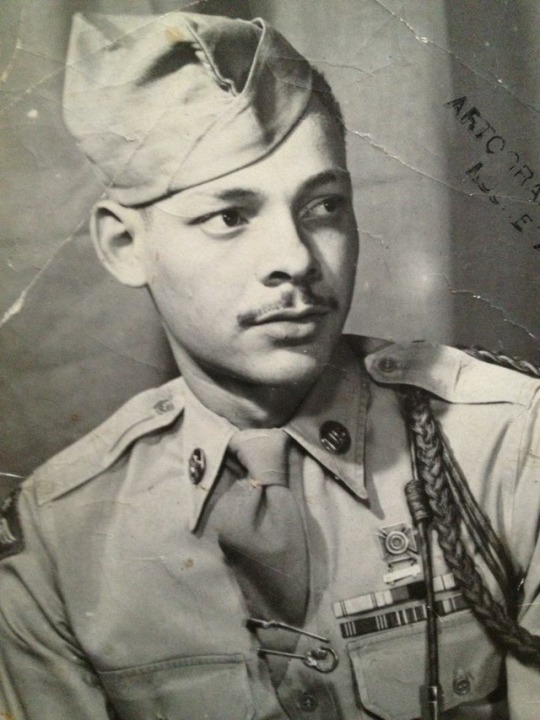
(This) is a pic of my great uncle, now deceased, who I remember for many things, his social justice activism, his poetry, the way he loved all the women in his life, and his mean pot of spaghetti. His time in the military was relatively short, just three years in between WW2 and Korea (1946-49). From what I understand, his service was, like many, a means to economic security, job training, and travel. Post military he worked for Sybron-Taylor Instruments until retirement, becoming one of the first African Americans to work as foreman and later division manager, in that company.
Submitted by Donna Auston
7 notes
·
View notes
Photo

Sarah’s dad. He saw life through the Toaster filter before that was even a thing.
1 note
·
View note
Photo


A few weeks back, we ended Season 1 of my podcast See Something Say Something with a LIVE SHOW at the Greene Space.
As a tribute to this Tumblr, one of my fave internet creations, I brought my dad on for a segment called RAD BROWN DADS LIVE. You can find that here, towards the end. We collected photos from a bunch of past guests and friends of the show, and I gave tribute to their wonderful style.
Like Sara’s dad! Seen above. My favorite thing about this photo is 1.) everything, but also, 2.) how it captures the rad brown obsession with FLOWERS. Like, here are two serious guys having conversations about Palestine, politics, and poetry — there are flowers on the drapes, a curiously FRAMED photo of a flower, and there’s probably a floral carpet too. Classic.
14 notes
·
View notes
Photo
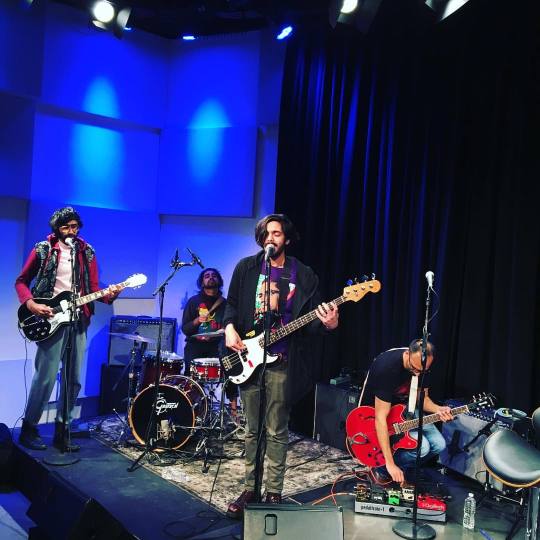
HELLO EVERYONE I have a live show today at @thegreenespacenyc featuring live music by @therealkominas! It's sold out, but follow along on the @buzzfeednews fb page (facebook.com/buzzfeednews) starting at 7 PM. Featuring @bimade @tabooradley @sarayasin86 @chaigoth @lulainlife Rais Bhuiyan, Moustafa Bayoumi, and a special guest appearance by my dad! (at The Greene Space at WNYC/WQXR)
5 notes
·
View notes
Photo
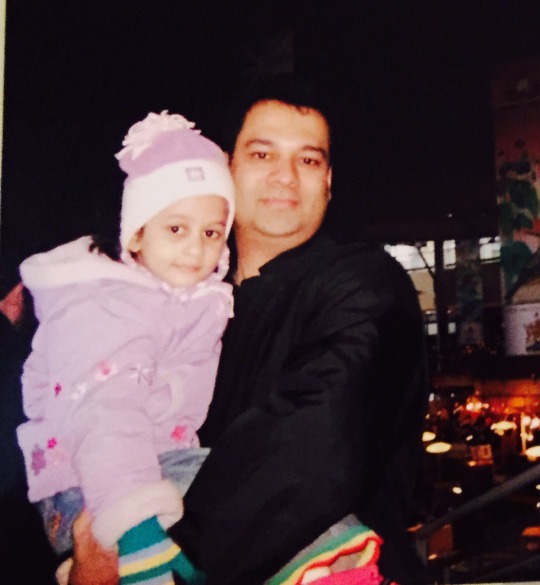
This is me and my very cool, very rad brown dad at Niagara Falls. I wanted to go to there for my birthday and he took me in the middle of winter even though he hates the cold.
How RBD of your dad to dress you in lilac and dress himself like Johnny Flippin’ Cash.
Submitted by damoosethings
12 notes
·
View notes
Photo
amazing

my favorite photo in 2017 at Women’s March 🚺
241K notes
·
View notes
Photo

Sikh gentlemen outside the entrance to Hyde Park Corner, London, 1935
3K notes
·
View notes
Text
Episode 2: Jinns — I bring in the ultimate spooky homies —The Kominas bassist/writer Basim Usmani, goth auntie Tabir Auntie, and professional (seriously!) spooky investigator Deonna Kelli Syed — to talk about jinns and spirits, and why the former totally gets a bad rap.
See Something Say Something Season 1
I’m gonna start updating this thread with each new episode of the podcast, which is my big new project. RBD was my first home on the internet, my first audience, so it feels like I should be sharing more with you guys. The link below is acast, so you can listen in your browser, but please also subscribe on iTunes, Spotify, or wherever you listen to your podcasts.
Episode 1: Saying “Nah” — I talk to two very smart people I wish I was as cool as, BuzzFeed general counsel Nabiha Syed and tech reporter Johana Bhuiyan, about moments when you were asked to speak for all Muslims and decided to say… nahhhhhh
8 notes
·
View notes
Text
See Something Say Something Season 1
I’m gonna start updating this thread with each new episode of the podcast, which is my big new project. RBD was my first home on the internet, my first audience, so it feels like I should be sharing more with you guys. The link below is acast, so you can listen in your browser, but please also subscribe on iTunes, Spotify, or wherever you listen to your podcasts.
Episode 1: Saying “Nah” — I talk to two very smart people I wish I was as cool as, BuzzFeed general counsel Nabiha Syed and tech reporter Johana Bhuiyan, about moments when you were asked to speak for all Muslims and decided to say... nahhhhhh
8 notes
·
View notes

